Cats
Dangerous Eats: Guide to Toxic Food for Cats

Cats have a reputation for being curious animals with unpredictable eating habits. While they may show interest in what humans are eating, it’s essential to be aware that not all foods are safe for them. Some human foods can be harmful to cats, posing significant risks to their health and overall well-being. To assist you in identifying potential hazards, we have compiled a detailed guide on toxic foods for cats.
In this guide, you’ll find a breakdown of various harmful snacks and ingredients that should be avoided when it comes to feeding your cat. By being aware of these hazards, you can take the necessary precautions to ensure your pet’s safety and optimal health. So, let’s dive in and learn more about the foods that can pose a threat to our furry companions.
Key Takeaways:
- Be aware of the toxic foods that can harm your cat’s health.
- Alcohol, chocolate, caffeine, grapes, onions, garlic, and xylitol are some of the common toxic substances for cats.
- Milk, raw/undercooked meat, and salty snacks should also be avoided.
- Cats have different dietary needs than humans, so it’s important to provide them with a balanced and appropriate diet.
- If you suspect your cat has ingested a toxic food or if they show any symptoms of poisoning, contact a veterinarian immediately.
Alcohol
Alcohol is highly toxic to cats and should never be given to them. The ingestion of alcohol can cause serious health issues, including poisoning and a range of alarming symptoms. These symptoms may include:
- Vomiting
- Diarrhea
- Decreased coordination
- Tremors
In severe cases, alcohol ingestion can even lead to death. It is crucial to recognize the signs of alcohol ingestion in cats and take immediate action. If you suspect that your cat has ingested alcohol, it is important to contact a veterinarian or the ASPCA Animal Poison Control Center immediately for guidance.
Preventing Alcohol Ingestion
Make sure to keep all alcoholic beverages securely stored and out of reach of your furry friend. Be aware of the risks when hosting parties or gatherings where alcohol is present. Educate your family members and guests about the dangers of alcohol ingestion for cats, emphasizing the importance of not sharing any alcoholic beverages with them.
“Alcohol is highly toxic to cats and can have severe consequences on their health. It’s crucial to keep all alcoholic beverages out of their reach to prevent accidental ingestion.”
Symptoms of Alcohol Ingestion in Cats
| Symptoms | Description |
|---|---|
| Vomiting | Expelling stomach contents forcefully. |
| Diarrhea | Persistent loose or liquid stools. |
| Decreased coordination | Unsteady movements and lack of balance. |
| Tremors | Involuntary shaking or trembling. |
Chocolate, Coffee, and Caffeine
When it comes to cats, chocolate, coffee, and caffeine are off-limits. These popular human treats contain a substance called methylxanthines, which are toxic to our feline friends. The ingestion of methylxanthines can have serious consequences for cats, resulting in various symptoms and even death.
One of the primary symptoms of methylxanthine poisoning in cats is vomiting. If your cat has consumed chocolate, coffee, or other caffeine-containing products, you may notice them experiencing bouts of vomiting. This is their body’s way of trying to remove the toxic substances.
Diarrhea is another common symptom of methylxanthine poisoning. Cats may experience loose stools or increased frequency of bowel movements. It is important to monitor your cat’s litter box for any changes in their stool consistency or frequency, as it can be an indication of ingestion.
Abnormal heart rhythm is another potential consequence of methylxanthine ingestion. Cats may develop an irregular heartbeat, which can be a serious and life-threatening condition. If you notice any changes in your cat’s heart rate or rhythm, it is crucial to seek immediate veterinary attention.
Tremors and seizures are also possible symptoms of methylxanthine poisoning. Cats may experience muscle tremors or even full-body seizures as a result of ingesting these toxic substances. These neurological symptoms require prompt veterinary care to ensure the well-being of your cat.
It is worth noting that dark chocolate poses a greater danger to cats compared to milk chocolate. The higher the cocoa content, the more methylxanthines it contains, making it more toxic to cats. However, all chocolate products should be kept out of reach of your feline companions to prevent accidental ingestion.
Here is a table summarizing the potential symptoms of methylxanthine poisoning in cats:
| Symptoms of Methylxanthine Poisoning in Cats |
|---|
| Vomiting |
| Diarrhea |
| Abnormal heart rhythm |
| Tremors |
| Seizures |
To protect your cat’s health, it is essential to keep chocolate, coffee, and caffeine-containing products well out of their reach. Be mindful of where you store these items and ensure they are securely sealed.
Remember, your cat’s well-being should always be a top priority, and avoiding toxic foods like chocolate, coffee, and caffeine is key to keeping them safe and healthy.
Grapes, Raisins, and Currants
Grapes, raisins, and currants can be extremely harmful to cats and may even lead to kidney failure. It is crucial to prevent your feline friend from ingesting these fruits and to be mindful of their potential effects on your cat’s health. The exact toxic substance in these fruits is unknown, but it is better to err on the side of caution and avoid feeding them to your cat altogether.
Even a small amount of grapes, raisins, or currants can cause illness in cats. Symptoms of ingestion may include vomiting, diarrhea, and hyperactivity. In rare cases, these fruits can lead to kidney disease, which can have serious consequences for your cat’s overall well-being.
If you suspect that your cat has consumed grapes, raisins, or currants, it is important to monitor their behavior closely and seek veterinary assistance immediately. Kidney failure can develop rapidly, and prompt medical attention is essential for a better prognosis.

In order to prevent any accidental ingestion, make sure to keep these fruits out of your cat’s reach in your home. Additionally, if you have a garden or landscaping where these fruits may grow, take precautions to ensure that your cat cannot access them.
Onions, Garlic, and Chives
Cats are known for their particular food preferences, but when it comes to onions, garlic, and chives, it’s important for cat owners to strictly avoid these ingredients. While they may add flavor to our meals, these vegetables can cause gastrointestinal irritation and potential harm to our feline friends.
The consumption of large amounts of onions, garlic, and chives can lead to red blood cell damage and anemia in cats. The toxic compounds present in these vegetables can disrupt the normal functioning of the cat’s red blood cells, impacting their overall health and well-being. It’s worth noting that cats are more susceptible to the toxic effects of onions, but dogs are also at risk if a large enough amount is consumed.
To ensure the safety and health of your pets, it’s best to avoid feeding onions, garlic, and chives to cats and dogs altogether. Even in small quantities, these ingredients can cause gastrointestinal discomfort and potentially lead to more severe health consequences. Instead, opt for cat-friendly foods that provide the necessary nutrition without posing any risks.
“Onions, garlic, and chives can cause gastrointestinal irritation and red blood cell damage in cats.”
Remember, it’s always better to be safe than sorry when it comes to your furry companions. By being mindful of the foods you feed them, you can help prevent gastrointestinal issues, red blood cell damage, and anemia. Consult with your veterinarian for a comprehensive list of foods to avoid and ensure that your cat’s diet is tailored to their unique nutritional needs.
Quick Tips:
- Avoid feeding onions, garlic, and chives to cats and dogs.
- Choose cat-friendly foods that provide balanced nutrition.
- Consult with a veterinarian for a comprehensive list of foods to avoid.

Milk and Dairy
Cats are generally lactose intolerant and cannot properly digest milk and other dairy products. Feeding cats milk and dairy-based foods can lead to digestive upset, including diarrhea. It is best to avoid giving cats milk and limit their consumption of other dairy products.
Cats lack the necessary enzymes to break down lactose, the sugar present in milk and dairy. When lactose is not properly digested, it can ferment in the cat’s digestive system, leading to gastrointestinal distress and discomfort. The result is often diarrhea and other digestive issues.
It is important to note that not all cats will experience lactose intolerance symptoms. Some cats may tolerate small amounts of dairy without any adverse effects. However, it is still recommended to exercise caution and limit their intake.
The Health Risks of Feeding Cats Milk and Dairy:
- Diarrhea: The consumption of milk and dairy products can disrupt the cat’s digestive system, causing loose stools or diarrhea. This is a common sign of lactose intolerance in cats.
- Abdominal Discomfort: Cats may experience abdominal cramps, bloating, and overall discomfort after consuming milk or dairy.
- Nutritional Imbalance: While milk and dairy products contain certain nutrients, they are not essential for a cat’s diet. Cats have specific dietary requirements that can be better met through a balanced cat food designed for their needs.
Instead of milk and dairy, cat owners can provide their feline friends with alternative sources of hydration such as fresh water or wet cat food. Wet cat food can help meet the cat’s moisture needs while also providing essential nutrients.
Milk and Dairy Alternatives:
If you are looking for alternative options to provide a creamy texture or additional sources of calcium, there are non-dairy alternatives formulated specifically for cats. These products are lactose-free and designed to be more easily digestible for cats with sensitive stomachs. Some options include:
| Alternative | Description |
|---|---|
| 1. Lactose-free cat milk | A specially formulated milk substitute designed for cats, without the lactose. |
| 2. Cat-friendly yogurt | Yogurt made specifically for cats, with probiotics and without lactose. |
It’s always best to consult with your veterinarian before introducing any new products to your cat’s diet, especially if your cat has pre-existing health conditions or dietary restrictions.
Raw/Undercooked Meat, Eggs, and Bones
Feeding your cat raw or undercooked meat, eggs, or bones can pose serious risks to their health. These foods can contain harmful bacteria such as Salmonella and E. coli, which can lead to food poisoning in cats. Additionally, giving cats raw bones can put them at risk of choking or injury to their digestive tract.
To ensure the safety of your cat, it’s important to thoroughly cook any meat or eggs before serving them. Cooking at high temperatures kills off bacteria and reduces the risk of infection. Avoid giving your cat any bones, as they can splinter and cause obstructions or puncture the digestive tract.
When preparing meals for your cat, it’s always best to stick to a balanced and nutritionally complete cat food diet. This ensures that your furry friend receives all the necessary nutrients without the risk of bacterial contamination or choking hazards.
| Foods to Avoid | Potential Risks |
|---|---|
| Raw meat and eggs |
|
| Raw bones |
|
Salt and Salty Snack Foods
Large amounts of salt and salty snack foods can have harmful effects on cats’ health. Excessive consumption of these foods can lead to various issues, including excessive thirst, increased urination, and even sodium ion poisoning.
Cats are particularly sensitive to sodium, and their bodies are not designed to process high levels of salt. When cats consume salt-heavy snacks, it can disrupt their body’s delicate balance and result in serious health complications.
Symptoms of salt poisoning in cats may include:
- Vomiting
- Diarrhea
- Depression
- Tremors
- Elevated body temperature
- Seizures
- Death (in severe cases)
To ensure the well-being of your feline companion, it is highly recommended to avoid feeding salt-heavy snacks to cats. Instead, provide them with a balanced and nutritionally appropriate diet that meets their unique dietary needs.
Remember, cats thrive on a protein-rich diet, and there are many cat-friendly treats available that are specifically formulated to meet their nutritional requirements.
| Salt Content in Common Salty Snacks | Amount of Salt (per 100g) |
|---|---|
| Potato Chips | 1,200mg |
| Pretzels | 1,900mg |
| Cheese Puffs | 1,400mg |
| Salted Popcorn | 700mg |

Xylitol
Xylitol is a popular sweetener used in various products, including gums, candies, baked goods, and toothpaste. While it may be safe for human consumption, it can be extremely dangerous for cats if ingested. Xylitol has the potential to cause a release of insulin in cats, leading to liver failure. It is crucial for cat owners to be aware of the symptoms of xylitol poisoning and take immediate action if their cat has been exposed to this sweetener.
The symptoms of xylitol poisoning in cats can vary depending on the amount ingested. They may experience vomiting, lethargy, loss of coordination, seizures, and an elevation in liver enzymes. It is essential to seek veterinary attention promptly if any of these symptoms are observed.
To prevent xylitol poisoning, it is vital to keep products containing xylitol out of reach of cats. Be cautious when using xylitol-containing toothpaste or leaving chewing gums and candies where cats can access them. Read product labels carefully and opt for xylitol-free alternatives whenever possible to ensure the safety and well-being of your feline companion.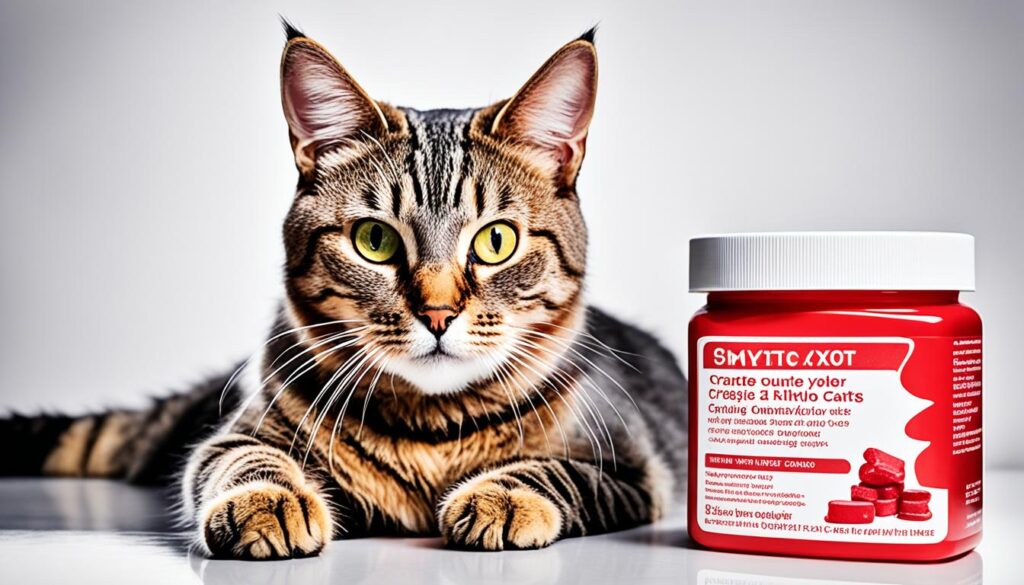
Key Points:
- Xylitol is a sweetener commonly found in gums, candy, baked goods, and toothpaste.
- Ingestion of xylitol can lead to insulin release in cats and result in liver failure.
- Symptoms of xylitol poisoning include vomiting, lethargy, loss of coordination, seizures, and elevated liver enzymes.
- Keep products containing xylitol away from cats to prevent poisoning and seek veterinary attention if symptoms are observed.
Other Foods to Avoid
In addition to the specific toxic foods mentioned above, it’s important to be cautious about other foods when it comes to feeding your cats. Cats have different dietary needs than humans and are obligate carnivores, meaning they require a protein-rich diet. Feeding cats cat food that is specifically formulated to meet their nutritional needs is essential for their overall health and well-being.
Cat food is designed to provide the necessary balance of protein, fats, and carbohydrates that cats require. It also contains essential vitamins and minerals that are specifically formulated for a cat’s dietary needs. Feeding cats a diet that consists primarily of human food can be detrimental to their health.
While occasional treats of human food can be given in small amounts, it’s important to be mindful of certain ingredients that may not be suitable for cats. Cats can have allergies or intolerances to certain foods, just like humans do. Some common allergens for cats include dairy products, seafood, and certain types of grains.
Additionally, certain foods may cause digestive issues in cats, even if they are not toxic. For example, spicy foods, rich sauces, and heavily seasoned foods can upset a cat’s stomach, leading to vomiting or diarrhea. It’s best to stick to a cat’s regular diet and avoid feeding them foods that can potentially cause digestive discomfort.
“Feeding cats cat food that is specifically formulated to meet their nutritional needs is essential for their overall health and well-being.”
When introducing new foods to your cat’s diet, it’s important to do so gradually and monitor their reaction. If you notice any signs of discomfort, such as vomiting, diarrhea, or changes in behavior, it may be an indication that your cat is intolerant or allergic to a certain ingredient. In such cases, consult with your veterinarian to determine the best course of action.
Common Foods to Avoid for Cats
| Foods to Avoid | Potential Risks |
|---|---|
| Chocolate | Toxic to cats, can cause vomiting, diarrhea, and abnormal heart rhythm. |
| Grapes, Raisins, and Currants | Can cause kidney failure in cats, symptoms may include vomiting, diarrhea, and hyperactivity. |
| Onions, Garlic, and Chives | Can cause gastrointestinal irritation and red blood cell damage, leading to anemia. |
| Milk and Dairy Products | Cats are generally lactose intolerant, can cause digestive upset and diarrhea. |
| Raw/Undercooked Meat, Eggs, and Bones | Can be contaminated with bacteria and pose a choking hazard or cause digestive injuries. |
| Salt and Salty Snack Foods | Excessive intake can lead to sodium ion poisoning and various health issues. |
| Xylitol | Sweetener that is toxic to cats and can cause liver failure. |
Remember, when it comes to cat food, dietary needs, allergies, and intolerances, it’s always best to consult with your veterinarian. They can provide tailored advice and recommend suitable options based on your cat’s specific needs. Prioritizing your cat’s health and providing a balanced, appropriate diet will ensure they lead a happy and healthy life.
Conclusion
Keeping cats safe from toxic food is essential for maintaining their health and well-being. By being aware of the common dangers associated with toxic food for cats, cat owners can take the necessary precautions to prevent their feline friends from ingesting harmful substances.
If there is any suspicion of ingestion or if symptoms of poisoning are observed, it is crucial to consult a veterinarian immediately. Prompt medical attention can make a significant difference in the outcome and recovery of a cat exposed to toxic food.
Prevention is key in protecting cats from the potential risks of toxic food. This includes keeping toxic foods out of reach, properly storing and disposing of them, and being mindful of what is being fed to cats. Providing a balanced and appropriate diet that meets their specific dietary needs is crucial for their overall health and longevity.
Remember, being proactive in preventing toxic food exposure can help keep our feline companions healthy and happy for years to come.FAQ
What foods are toxic to cats?
Why is alcohol toxic to cats?
What are the dangers of chocolate, coffee, and caffeine for cats?
Can grapes, raisins, and currants be harmful to cats?
What are the risks of onions, garlic, and chives for cats?
Can cats consume milk and dairy products?
Why should raw or undercooked meat, eggs, and bones be avoided?
How does salt and salty snack foods affect cats?
Why is xylitol dangerous for cats?
Are there other foods that should be avoided for cats?
As our Editor-in-Chief, James plays a pivotal role in ensuring the quality and integrity of our content. With a keen eye for detail and a passion for storytelling, James oversees the editorial process here at A Place for Animals. With years of experience in content editing, James ensures that every piece of content meets our high standards of accuracy and clarity. Under James’ guidance, you can rest assured that the content you read is informative and impeccably crafted.
Dogs
Dogs Are Better Than Cats: 7 Reasons

We are firm believers that dogs surpass cats for seven crucial reasons. Dogs, who have their origins in Central Asia 15,000 years ago, provide loyalty and companionship. They excel at tasks such as herding and guarding. Dogs offer health benefits, including disease detection and boosting immunity. They encourage active lifestyles and cognitive stimulation. Dogs form strong social bonds, which help to build communities and enhance social interactions. Their responsiveness to training commands strengthens the bond between humans and dogs. Dogs are also excellent at cleaning up after themselves, preferring to do their business outside. For more compelling reasons why dogs are superior, delve deeper into the topic.
Key Takeaways
- Dogs offer superior disease detection with their keen sense of smell.
- Dogs reduce allergies and asthma risks in children through immune system benefits.
- Dogs promote physical activity, social interactions, and community engagement.
- Dogs are trainable, responsive, and form strong social bonds with humans.
- Dogs contribute to indoor cleanliness by going potty outdoors and shedding less fur.
Historical and Cultural Significance
Dogs have long held a prominent place in history and culture, embodying qualities of loyalty and companionship across various civilizations. Unlike cats, who were domesticated in Egypt around 4,000 years ago, dogs have been by our side for approximately 15,000 years, originating in Central Asia. Throughout history, dogs have served a multitude of roles, from herding livestock to guarding homes. In contrast, cats were revered in ancient Egypt, with the goddess Bastet symbolizing their cultural significance.
Dogs haven't only been our companions but have also played integral roles in myths and folklore, representing loyalty, protection, and friendship in diverse cultures worldwide. The recognition of 189 dog breeds by the American Kennel Club showcases the extensive historical and cultural impact dogs have had on human societies. From hunting partners to service animals, dogs have woven themselves into the fabric of our history and continue to be cherished for their unwavering loyalty and companionship.
Health Benefits and Abilities

Highlighting the remarkable health benefits and abilities that dogs offer, it's fascinating to explore how these furry companions contribute to our overall well-being and daily lives. Dogs have a superior sense of smell and can be trained to detect diseases like cancer, showcasing their incredible ability to aid in early detection. Exposure to dog dust has been linked to preventing allergies and asthma in children, highlighting the immune-boosting potential of having a dog around. Additionally, dogs encourage physical activity and a healthy lifestyle by promoting regular exercise, keeping both their owners and themselves fit and active. Their cognitive abilities are also impressive; dogs can be trained to take selfies and respond to commands on iPads, demonstrating their intelligence and adaptability. Moreover, having a dog around can help build immunity in infants by altering intestinal bacteria, providing a natural boost to the immune system. These health benefits and abilities make dogs invaluable companions for a healthier and happier life.
| Health Benefits and Abilities | |
|---|---|
| Superior sense of smell for disease detection | Prevention of allergies and asthma |
| Encouragement of physical activity | Impressive cognitive abilities |
| Boosting immunity, especially in infants |
Social Interactions and Connections

Dogs are known for their ability to form strong social bonds with both humans and other dogs, enhancing our connections with others.
Their friendly and approachable nature often leads to interactions with fellow dog owners during walks and outings.
These interactions can foster a sense of community and belonging among dog owners, creating opportunities for shared experiences and friendships.
Canine Social Bonds
Engaging with canine companions fosters meaningful social connections and interactions, enriching our lives in various ways. Dogs not only increase social interactions but also promote community engagement through activities like dog meetups and dedicated social media pages. Laughter and shared playful interactions with dogs contribute to a higher quality of life. Additionally, owning a dog encourages physical activity as dog owners tend to walk more, leading to improved fitness levels and overall well-being. The bond between humans and dogs goes beyond companionship, extending to enhancing our social experiences and well-being. Below is a table summarizing the positive impact of canine social bonds:
| Aspects | Benefits |
|---|---|
| Social Interactions | Increased interactions |
| Community Engagement | Promotes community involvement |
| Physical Activity | Encourages regular exercise |
Feline Independence Nature
Exploring the feline independence nature reveals a distinctive approach to social interactions and connections compared to dogs. Cats tend to exhibit more independent behavior, leading to fewer social interactions. Their selective nature when socializing results from their historical role as hunters, impacting how they respond to social stimuli.
Unlike dogs, whose sociable behavior encourages owners to engage in more social activities, cats prefer solitude and choose when to interact. Understanding the feline independence nature helps us appreciate their unique way of forming connections, which may be more subtle but equally meaningful.
While dogs promote increased social interactions, cats offer a different perspective on companionship, appealing to those who value independence and selective social bonds.
Training and Responsiveness
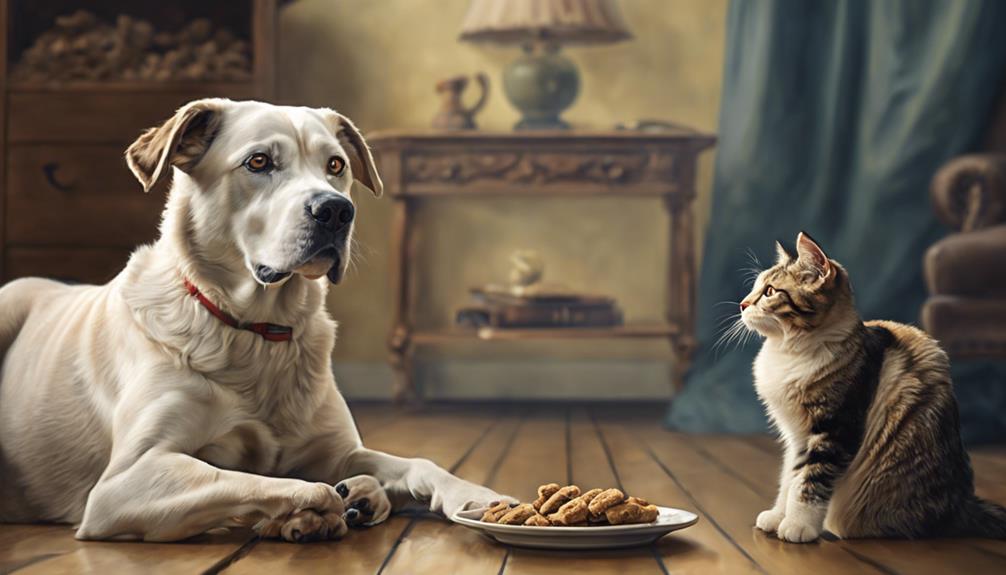
When it comes to training and responsiveness, the key factor that sets dogs apart from cats is their innate ability to learn and adapt to various tasks. Dogs can be trained to perform a wide range of tasks, showcasing their high level of responsiveness to commands and cues. This trainability not only demonstrates their intelligence but also enhances the bond between dogs and humans through effective communication.
On the other hand, cats, historically used for hunting, may exhibit less responsiveness compared to dogs. While cats may recognize their names, they often display selective hearing by choosing not to respond. This behavior contrasts with dogs' enthusiasm to learn and their willingness to engage in training exercises.
Allergies and Asthma Prevention

Exposure to dog dust has been proven to lower the likelihood of developing allergies and asthma in kids. Having a dog around can change the gut bacteria, which in turn boosts the immune system.
Dogs can help strengthen immunity in young ones, potentially decreasing the risk of allergies and asthma.
Pet Dander Control
Pets play an important role in maintaining a healthy environment by controlling pet dander, thereby helping prevent allergies and asthma. Exposure to dog dust can reduce the risk of allergies and asthma in children. Dogs alter intestinal bacteria, leading to improved immune responses and allergy prevention. Having a dog around can help build immunity in infants and children. Dogs provide unique health benefits that aid in preventing allergies and asthma. Cats do not offer the same protective effects against allergies and asthma as dogs do.
| Key Points |
|---|
| Exposure to dog dust can reduce allergies and asthma risk in kids. |
| Dogs alter intestinal bacteria, improving immune responses. |
| Having a dog can boost immunity in infants and children. |
| Dogs offer unique health benefits for allergy and asthma prevention. |
| Cats lack the protective effects against allergies and asthma that dogs provide. |
Respiratory Health Benefits
Dogs' unique respiratory health benefits, particularly in preventing allergies and asthma, make them invaluable companions for individuals seeking improved well-being. Exposure to dog dust can reduce the risk of allergies and asthma in children, thanks to the alterations in intestinal bacteria that lead to a better immune response.
Studies also indicate that having a dog around can help build immunity in infants, demonstrating the positive impact dogs make on respiratory health. Compared to cats, dogs provide distinct advantages in preventing respiratory issues, contributing to a healthier home environment overall. For people concerned about allergies and asthma, having a dog may offer significant benefits in maintaining better respiratory health.
Cleanliness and Housekeeping

Maintaining a clean and tidy home is easier with dogs, as they can be trained to do their business outside, reducing the need for indoor cleanup. Dogs help you make sure your house stays fresh and clean by learning to go potty outdoors. Dog houses are typically cleaner and neater compared to homes with cats, as dogs keep their bathroom activities outside.
Regular de-shedding of dogs can also help you maintain cleanliness in your house, minimizing fur around the place. Cats and dogs have different bathroom habits, with dogs needing to be taken outside for their business. Dogs can even be trained to let you know when they need to go outside, making the cleanup process more manageable.
Cats, on the other hand, require litter boxes, which can sometimes create odors and messes in the house. Additionally, cats may vomit or cough up hairballs, leading to extra cleaning tasks around the house.
Celebration and Festivities

During festive occasions, dogs bring an extra element of joy and excitement with their enthusiastic participation. Holiday celebrations become even more special when our furry friends join in the fun. Dressing up dogs in costumes for Halloween is a popular activity that many pet owners enjoy. Seeing our pets prance around in themed outfits adds to the festive spirit and creates lasting memories.
Including dogs in holiday activities like parades or family gatherings can make these events even more enjoyable. Pets, especially dogs, have a way of spreading happiness and bringing people together during festive occasions. The experience of dressing up and going out with a dog during holidays can be heartwarming and delightful.
Frequently Asked Questions
What Are 5 Reasons Dogs Are Better Than Cats?
When comparing dogs and cats, five reasons why dogs are superior include their trainability, security instincts, encouragement for physical activity, constant companionship, and unwavering loyalty.
Dogs excel in learning commands, alerting owners of potential threats, motivating owners to exercise, showing excitement when reunited, and staying devoted during tough times.
These qualities make dogs exceptional pets that enhance our lives in numerous ways.
Why Do Dogs Obey Better Than Cats?
Dogs obey better than cats due to their history of working with humans and training. Dogs' ability to follow commands stems from their trainable nature and desire to please their owners. Through training, dogs learn behaviors and cues, enhancing their responsiveness to instructions.
Cats, historically used for hunting, may exhibit less obedience.
The bond between dogs and humans is strengthened by their obedience, making them excellent companions who can work and communicate effectively with us.
What Is Better Dogs or Cats?
When considering whether dogs or cats are better, it ultimately depends on individual preferences and lifestyle. Dogs offer loyalty, companionship, and are great for physical activities like running.
On the other hand, cats are independent and require less maintenance. Both have their unique qualities, so the choice between dogs and cats boils down to personal needs and what one values in a pet.
Choose based on what aligns best with your lifestyle and preferences.
Are Dogs More Loyal Than Cats?
Yes, dogs are generally more loyal than cats. This loyalty is evident in their protective instincts and unwavering dedication to their owners. Dogs prioritize their owner's safety and well-being, forming strong bonds based on trust and companionship.
While cats may exhibit independent behavior, dogs consistently display loyalty and devotion, making them excellent companions for those seeking faithful and devoted animal companions.
Can Antibiotics Affect a Dog’s Behavior and Health, Making Them a Better Pet Than Cats?
Some antibiotics and increased urination in dogs can affect their behavior and health. While it’s important to consult a veterinarian first, antibiotics can improve a dog’s health, making them more active and lively pets than cats. Regular check-ups and proper medication can help ensure a happy and healthy pet.
What Are the Benefits of Feeding Raw Dog Food Compared to Traditional Dog Food?
When it comes to the benefits of raw dog food, many dog owners believe it offers a more natural and nutritious option for their pets. Raw dog food advocates claim it can improve digestion, promote healthier coats and skin, and increase energy levels in dogs compared to traditional dog food.
Conclusion
To sum up, dogs truly are man's best friend. Their loyalty, intelligence, and companionship make them the superior pet choice.
Just like a trusty sidekick in a superhero movie, dogs are always there to support and protect us.
So next time you're considering getting a pet, remember the numerous benefits that come with having a furry four-legged friend by your side.
Choose a dog, and you won't be disappointed!
Dana is our Lead Content Writer, bringing a wealth of knowledge and expertise to our team. With a background deeply rooted in animal studies and a profound love for all creatures, Dana is dedicated to crafting engaging and informative content that resonates with our audience. With Dana at the helm, you can trust that our content is accurate and engaging, catering to the diverse interests of animal enthusiasts everywhere.
Cats
Perfect Black and White Cat Breeds for You
Journey into the world of black and white cat breeds with the letter 'J' for a surprising pick that will captivate you from the start!
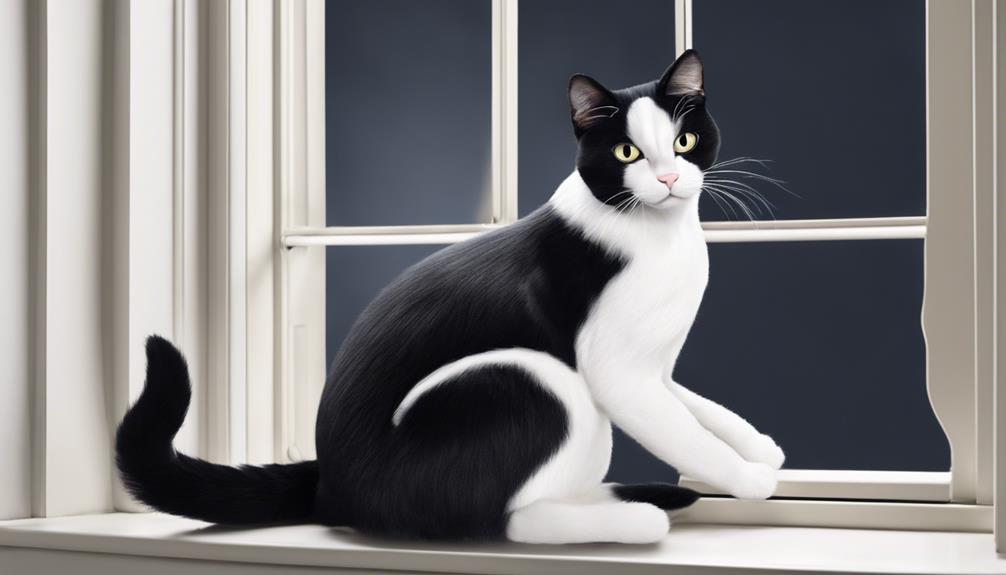
When searching for the perfect black and white cat breed, the Turkish Angora stands out with its luxurious long-haired coat, loving personality, and love for water activities. This breed features silky, shiny fur, well-proportioned bodies, and a lively attitude. Their fun-loving, sociable nature and high intelligence make them excellent companions. Regular grooming and interactive playtime are essential for their health and happiness. If you’re intrigued by the Turkish Angora’s distinctive characteristics, there is a lot more to learn about this charming breed’s temperament, adaptability, and suitability for different households.
Key Takeaways
- Maine Coon: Versatile with over 75 color combinations.
- Turkish Angora: Stunning black and white coats.
- Manx and Cymric: Playful, tailless breeds.
- Oriental Shorthair: Visually stunning patterns and colors.
- Scottish Fold: Unique charm with folded ears.
Maine Coon
Maine Coons, recognized as one of the largest domestic cat breeds, exhibit a striking appearance with their long, double coat and over 75 color combinations. These majestic felines can reach up to 16 inches in height and weigh between 9 to 17 pounds, making them a presence to behold in any home.
Their intelligence is remarkable, allowing them to adapt easily to various environments and situations. What truly sets Maine Coons apart is their dog-like personalities. They aren't your typical aloof cats; instead, they form deep bonds with their human companions, displaying loyalty and affection.
Maine Coons are like no other, enjoying interactive play and even walking on leads, showcasing their unique and adaptable nature. If you seek a feline friend with a regal presence, a loving heart, and a touch of playfulness, the Maine Coon might just be the perfect match for your family.
Cornish Rex
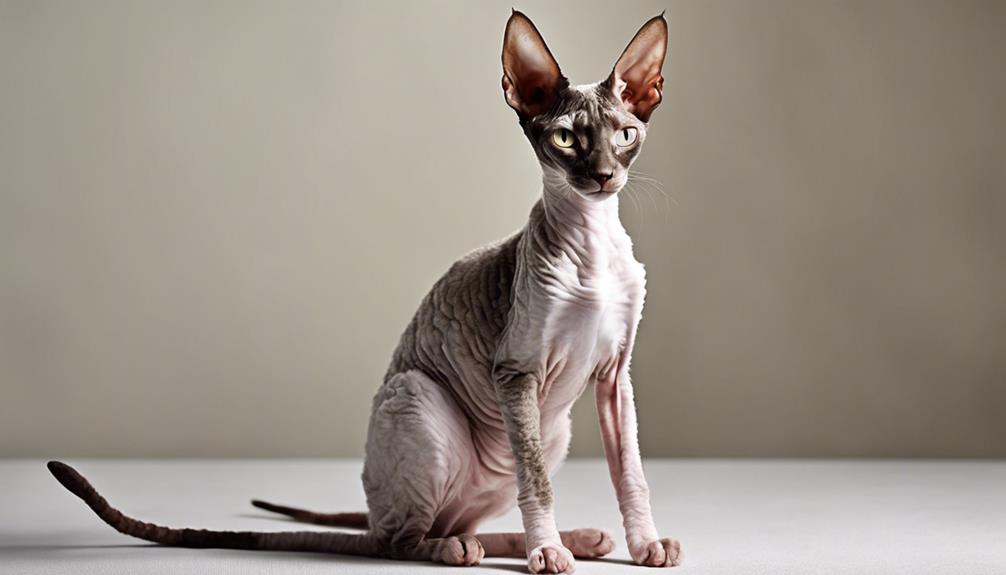
Cornish Rex cats sport unique curling coats that set them apart from other breeds, adding a touch of charm to their playful and affectionate personalities.
Their energetic nature and sociable demeanor make them delightful companions for families seeking an interactive and loving pet.
With a lifespan ranging from 10 to 16 years, these intelligent and engaging felines promise long-lasting joy and fun.
Unique Curling Coats
With their unique tight, curly coats, the Cornish Rex cats stand out among other breeds, making them a favorite among allergy sufferers and cat enthusiasts alike. Their hypoallergenic nature, thanks to minimal shedding and lower levels of the Fel d1 protein, appeals to those with sensitivities.
Not only do these cats offer a practical solution for allergy concerns, but their distinct coat texture provides a soft, velvety feel that's delightful to touch. The range of colors and patterns in which the Cornish Rex's coat comes adds to their striking appearance, making them visually enchanting.
Beyond their aesthetics, these cats are also known for their high activity levels and intelligence, requiring mental stimulation and playtime to keep them content and engaged.
Playful and Affectionate
We find Cornish Rex cats to be lively and affectionate companions, known for their playful nature and strong bonds with their human family. These black and white cat breeds aren't only energetic but also highly interactive, making them a joy to have around.
Their intelligence shines through as they enthusiastically participate in games and activities, always excited for engaging playtime. The unique coat of tight, curly hair adds to their charm, making them stand out in the feline world.
Their affection knows no bounds, forming deep connections with those they hold dear. With a Cornish Rex by your side, you can expect endless love, entertainment, and companionship.
Manx

Manx cats are renowned for their distinctive feature of being tailless or having short tails, a genetic trait that sets them apart from other feline breeds.
Their playful and affectionate nature makes them delightful companions, as they enjoy forming strong bonds with their human family members.
Additionally, Manx cats are known to be excellent jumpers, thanks to their powerful hind legs, and they're intelligent pets that quickly grasp new concepts, making them engaging and interactive companions.
Unique Tailless Feature
Renowned for their unique tailless feature, Manx cats display a special charm that distinguishes them from other breeds. This exceptional trait not only enhances their appeal but also boosts their leaping abilities, thanks to their strong hind legs.
The circular head and expressive eyes of the Manx cat contribute to their enchanting appearance, making them even more lovable. Despite their absence of a traditional tail, Manx cats are surprisingly nimble and playful, always eager for a game or a lively chase.
Their tailless nature adds an element of fascination to these already intriguing felines, making them a delightful addition to any family seeking a cat with a distinctive touch.
Playful and Affectionate
With their playful nature and affectionate demeanor, these tailless Manx cats are delightful companions for families seeking a loving feline friend. Manx cats' short tails and exceptional jumping abilities make them agile playmates, always ready for a game of chase or a pounce on their favorite toy.
Their sociable nature means they thrive on human interaction, forming strong bonds with their family members. Whether it's learning tricks or just cuddling up on the couch, Manx cats are intelligent and loving companions.
Available in various colors and patterns, including the classic black and white tuxedo look, these cats bring both charm and companionship to any home. If you're looking for a cat that's both playful and affectionate, the Manx breed might just be the perfect choice for you.
Munchkin

Recognized for their unique short legs that resemble those of Dachshunds, Munchkin cats are lively and spirited companions. These high-energy felines adore interactive play and are always ready for a game with kids, dogs, or their humans. Their mischievous personalities have earned them the nickname 'magpies', mirroring their playful nature and love for entertainment. Despite their shorter stature, Munchkins are surprisingly agile and skilled at keeping up with all the action.
Munchkin cats aren't only fun-loving but also enchanting and delightful, making them fantastic additions to any family. Their continual willingness to engage in play and entertain ensures that there's never a dull moment with these charming companions around. Whether it's chasing a toy or simply exploring their surroundings, Munchkins bring joy and liveliness to any household. With their lovable nature and playful antics, Munchkin cats are certain to capture the hearts of their owners and create lasting memories filled with laughter and fun.
Oriental Shorthair

Sleek-bodied with large ears and almond-shaped eyes, Oriental Shorthair cats come in a wide variety of patterns and colors, including striking black and white coats. These feline companions aren't only visually stunning but also possess inquisitive personalities that will keep you on your toes. Known for being chatty, Oriental Shorthairs love to communicate with their humans, making them great conversationalists in the house.
What sets them apart is their love for interactive play. Whether it's chasing after a feather toy or batting around a ball, these cats thrive on engaging activities that stimulate their minds and bodies. If you're looking for a cat that enjoys being part of the action and forming a strong bond with you, the Oriental Shorthair could be the perfect fit.
With their sleek appearance, expressive eyes, and playful demeanor, Oriental Shorthairs bring a lively energy into any home. If you're ready for a feline friend that loves to chat and play, consider adding an Oriental Shorthair to your family.
Persian
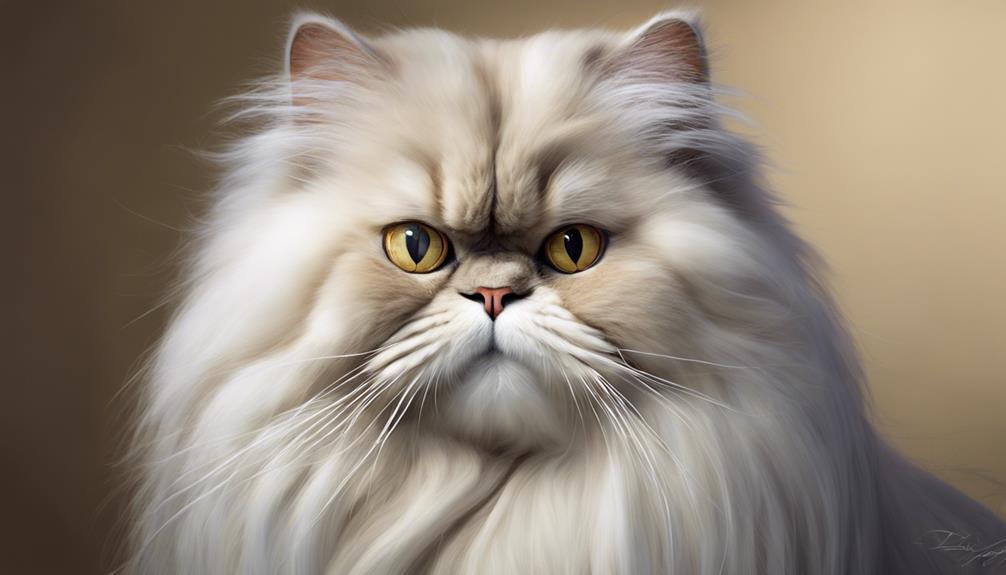
Moving from the discussion of Oriental Shorthair cats, we now shift our focus to the Persian breed. Persians are renowned for their glossy coats that require daily grooming due to their long length, making them strikingly beautiful cats. Their large mesmerizing eyes are enchanting and add to their charm.
What sets Persians apart is their docile nature; they're calm, affectionate, and enjoy spending time with their owners. These fluffy felines are true lap cats, seeking attention and affection from those they trust. Their placid temperament makes them ideal companions for individuals seeking a gentle and loving pet.
While Persians are generally calm and laid-back, they do require a time commitment for grooming to maintain their luxurious coats in top condition. If you're looking for a loving and affectionate furry friend that enjoys lounging around and being pampered, the Persian breed might be the perfect choice for you.
Scottish Fold
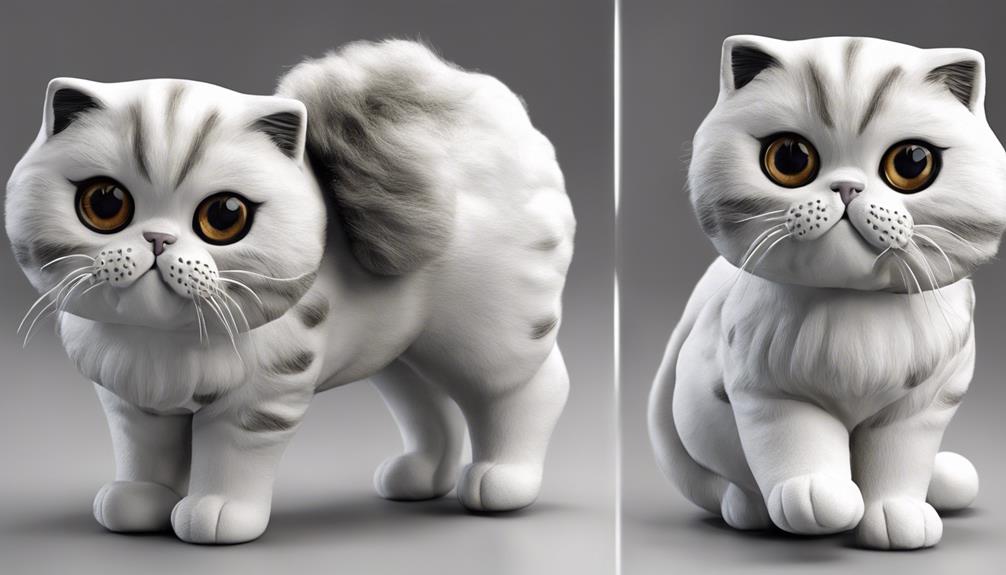
Scottish Folds are known for their distinctive folded ears that give them an adorable look.
These cats are playful and affectionate, forming strong bonds with their favorite human.
Their rounded features contribute to their unique charm, making them a popular choice among cat enthusiasts.
Unique Folded Ears
With their distinctive folded ears adding to their charming appearance, the Scottish Fold breed of cats is known for its unique feature that sets them apart from other feline companions. These folded ears are a result of a genetic mutation affecting cartilage development, giving Scottish Folds their signature look.
The rounded appearance of this breed, including their round head, eyes, and toes, complements the folded ears perfectly. Scottish Folds aren't only visually appealing but are also known for their loyalty and affectionate nature. They tend to form strong bonds with one person in the family, showing unwavering devotion.
Their sweet and gentle demeanor makes them wonderful companions for both families and individuals seeking a loving and devoted feline friend.
Playful and Affectionate
Exuding warmth and playfulness, these affectionate felines delight in forming strong bonds with their human companions. Scottish Fold cats, with their charming folded ears and rounded features, aren't only visually appealing but also incredibly loving and interactive. Here are three reasons why Scottish Folds make wonderful companions:
- Loyal Companions: These intelligent cats tend to bond closely with a specific person in the family, showing unwavering loyalty and affection.
- Playful Nature: Scottish Folds enjoy engaging in playtime, especially with toys that challenge their clever minds, making them a joy to interact with.
- Need for Human Connection: These affectionate cats can experience anxiety if left alone for extended periods, preferring the company and attention of their human friends.
Siberian Cat

Siberian cats, known for their semi-long fur coats and large paws, have a charming and fluffy appearance. This fluffy breed, also known as the Siberian Forest cat, is a popular choice for those seeking a cuddly companion. These cats are best suited for homes with outdoor access, where they can explore and roam freely. However, they may not be the ideal choice for city living or apartments due to their active nature and need for space.
Their super-soft fur adds to their appeal, making them gentle and observant companions. Siberian cats may exhibit pouncing behavior when engaged in play, showing their playful side. When they were brought to the UK in 2002, they captured the hearts of many with their striking looks and endearing personalities.
Turkish Angora
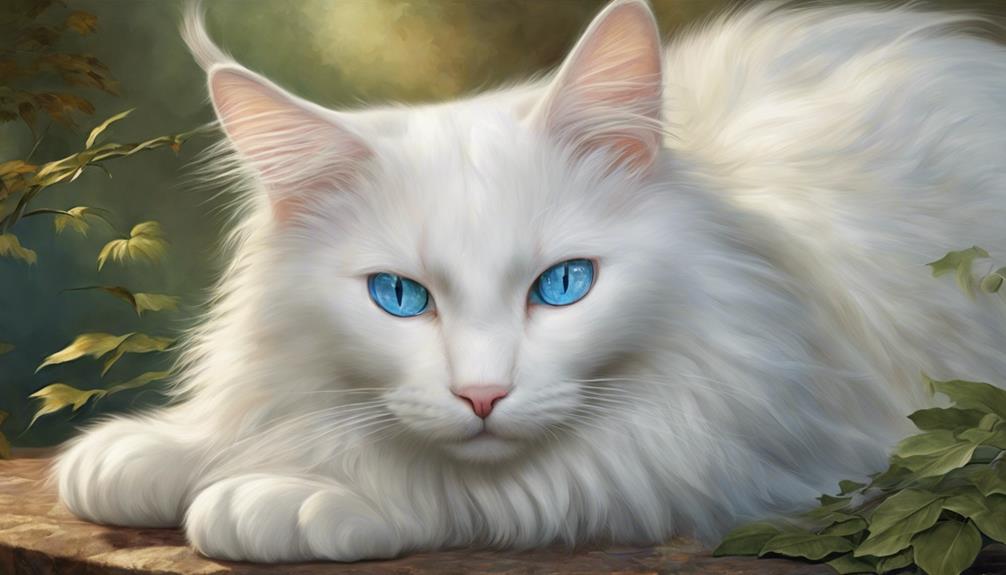
Let's talk about Turkish Angoras and what makes them unique.
These cats are known for their stunning longhaired coats that can come in black and white.
They aren't only beautiful but also affectionate and playful companions, making them a delightful addition to any household.
Turkish Angora Characteristics
The Turkish Angora, with its exquisite longhaired coat and affectionate nature, is a mesmerizing breed known for their intelligence and engaging personality. When considering this breed, keep in mind these key characteristics:
- Their soft, glistening fur and symmetrical bodies make Turkish Angoras visually striking.
- Turkish Angoras exhibit affectionate behavior towards their owners, enjoying interactive playtime with stimulating toys.
- These cats come in various colors, including the classic black and white pattern, showcasing their unique physical features.
Turkish Angoras aren't only beautiful but also intelligent and active, making them delightful companions. Their affinity for water-related activities adds an extra element of fun to their already charming personalities.
Turkish Angora Temperament
With their playful and active nature, Turkish Angoras exhibit an affectionate temperament that thrives on interaction with their owners. These cats are not only playful but also highly intelligent, making them a joy to have around. Their social nature means they enjoy being part of the family activities and will often seek out attention and companionship. Turkish Angoras are known for their love of water, adding an entertaining element to their already lively personalities. Additionally, their intelligence allows them to be trained to do tricks, showcasing their adaptability and quick learning abilities. If you're looking for a cat that is not only playful and active but also affectionate and intelligent, the Turkish Angora could be the perfect match for you.
| Playful | Affectionate | Intelligent |
|---|---|---|
| Yes | Yes | Yes |
Turkish Angora Care
Ensuring proper grooming practices is essential for maintaining the health and beauty of Turkish Angoras, especially considering their exquisite longhaired coats and active nature. When caring for a Turkish Angora, remember these key points:
- Regular Brushing: Their longhaired coats require frequent brushing to prevent mats and tangles, keeping their fur soft and glistening.
- Interactive Play: Engage in playtime activities to fulfill their need for mental stimulation and exercise, enhancing their affectionate nature.
- Color Varieties: Turkish Angoras come in various colors, such as the striking black and white combination, adding to their unique charm.
British Shorthair

Among the various black and white cat breeds discussed, one particularly stands out for its kind and easy-going personality – the British Shorthair. These cats are beloved for their dense coats and gentle temperament, making them perfect for family life. British Shorthairs are not only affectionate but also get along well with other pets, including dogs, and are great with children. Their laid-back nature and adaptability make them ideal companions for those seeking a loving feline friend. Below is a table summarizing key characteristics of the British Shorthair:
| Characteristic | Description |
|---|---|
| Coat | Dense and thick |
| Temperament | Gentle and easy-going |
| Suitability for Kids | Excellent; great with children |
| Adaptability | Able to adjust well to different environments |
British Shorthairs are not only beautiful with their black and white coats but also bring warmth and joy to any household they become a part of.
Cymric

Cymric, a long-haired cat variant of the Manx breed, is known for its unique tail characteristics, including being tailless or having stump tails. These felines are truly special companions, and here's why:
- Tailless Beauty: Cymrics' taillessness or short tails add to their charm and make them stand out among other cat breeds.
- Affectionate Personalities: Cymrics aren't just unique in appearance but also in their loving nature. They thrive on attention and are happiest when surrounded by affectionate humans.
- Legendary Tails: According to legend, the Cymric's tail story goes back to Noah's ark, where the Manx cats boarded last, and as the door closed, it caught their tails, resulting in them losing their length. This mythical tale adds an intriguing layer to these delightful feline companions.
Cymrics make wonderful pets for those seeking a loving and one-of-a-kind furry friend. Their affectionate demeanor and distinctive appearance make them perfect for individuals looking for a special bond with their feline companions.
Japanese Bobtail

Japanese Bobtail cats, known for their distinctive pom-pom tails, are revered as symbols of good luck in Japanese culture. These original lucky cats sport a charming mix of black, red, and white fur, adding to their unique allure. Believed to bring good luck to those who own them, Japanese Bobtails aren't just visually striking but also possess a special vocalization. Their sing-song meow is unlike any other, making them even more endearing companions. The playful nature of the Japanese Bobtail, combined with their elegant appearance, makes them a favorite among cat enthusiasts.
Their distinctive tails, resembling a waving pom-pom, are a standout feature that sets them apart from other breeds. This breed's history intertwined with Japanese folklore adds to their mystique. Whether you're drawn to their striking appearance or the promise of good fortune, Japanese Bobtails are sure to captivate you with their charm and unique vocalizations.
Siberian Forest Cat
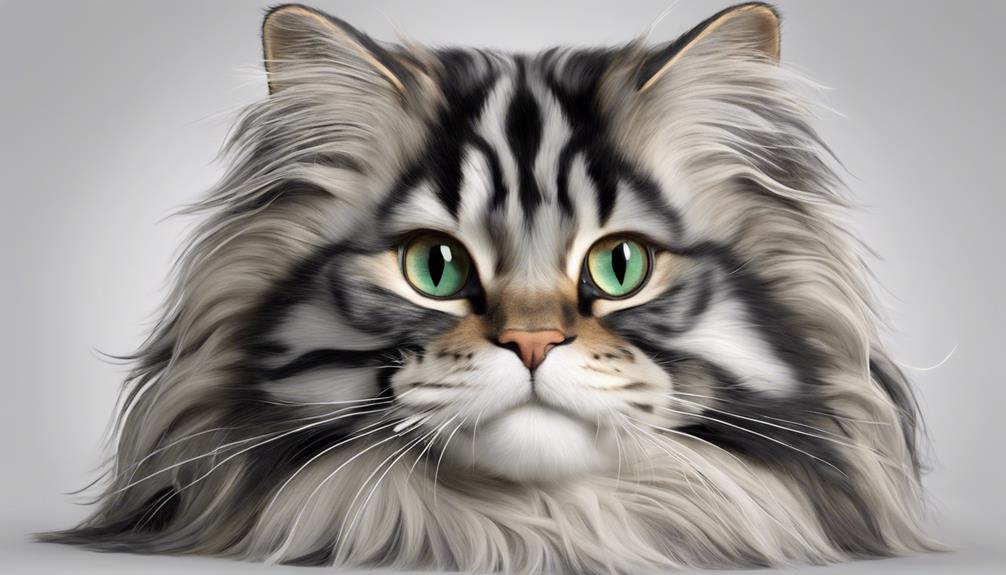
With their fluffy coats and large paws, Siberian Forest Cats are known for their distinctive physical features. These beautiful felines are best suited for homes with outdoor access, as they love to explore and roam in nature.
Here are some key points about Siberian Forest Cats:
- Active Nature: Siberian Forest Cats aren't ideal for city living or apartments due to their need for space and outdoor stimulation.
- Super-Soft Fur: One of the most appealing traits of the Siberian Forest Cat is their luxurious, soft fur, which makes them a joy to pet and cuddle.
- Independent Yet Affectionate: These cats strike a perfect balance between independence and affection. They enjoy their alone time but also appreciate snuggles and companionship.
If you're looking for a cat that embodies both elegance and a wild spirit, the Siberian Forest Cat might just be the perfect addition to your family.
Turkish Van

Known for their sturdy build and playful nature, Turkish Vans have a unique affinity for water. These sociable cats sport a distinctive van pattern, with a white body adorned with color spots, creating a beautiful coat pattern that's sure to catch your eye. Their love for water sets them apart from other breeds, making bath time an enjoyable experience rather than a dreaded task.
Turkish Vans aren't only known for their stunning appearance but also for their engaging personalities. They love interactive play and are always up for a game with their favorite humans. Their sociable nature makes them wonderful companions, as they enjoy spending time with their family members.
Whether they're chasing after toys or splashing in water, Turkish Vans bring joy and excitement into any home. With their unique coat pattern and playful demeanor, these cats are sure to capture your heart and keep you entertained for hours on end.
Ragamuffin
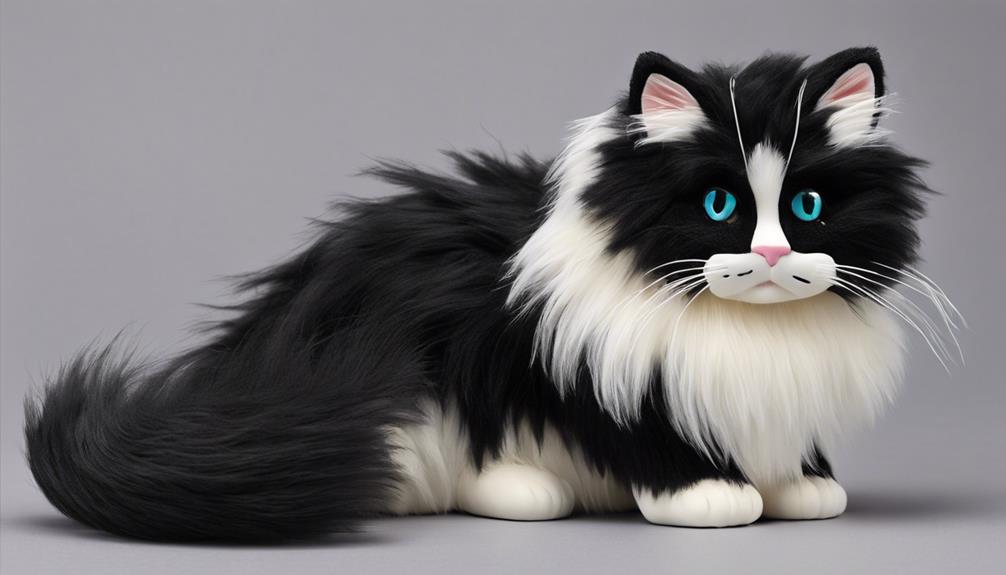
Cuddly and gentle, Ragamuffins are adored for their affectionate nature and playful demeanor. These large cats boast a rectangular balanced body structure, making them not only visually diverse with a variety of colors and patterns but also genetically healthy for long and happy companionship. Here are some key points to ponder about Ragamuffins:
- Affectionate Behavior: Ragamuffins are known for their loving and warm personalities. They enjoy spending time with their human companions, often seeking out cuddles and pets.
- Great Family Pets: Due to their friendly nature and sociable behavior, Ragamuffins make excellent family pets. They're gentle with children and are happy to be a part of the family activities.
- Long and Happy Companionship: With their robust genetics and strong health, Ragamuffins can provide many years of joy and friendship. Their playful antics and loyalty ensure a lasting bond that brings happiness to any household.
Frequently Asked Questions
What Breed Is My Cat if It's Black and White?
We love black and white cats! They can belong to various breeds like British Shorthair, Cymrics, Maine Coon, Munchkin, and Japanese Bobtail. Each breed offers unique traits, from kind personalities to cheeky playfulness.
Are Black and White Cats the Most Affectionate?
We believe black and white cats are among the most affectionate. They tend to seek love and attention, showing devotion through playful interactions. Their sweet and loving nature makes them cherished companions for those seeking a loyal and cuddly feline friend.
What Personality Does a Black and White Cat Have?
Black and white cats have a diverse range of personalities. From gentle and loyal to energetic and playful, they exhibit traits like affection, intelligence, and sociability. These feline companions can be great for various lifestyles.
Should I Get a Black and White Cat?
We should get a black and white cat if we're ready for commitment, love, and playful company. They bring joy and companionship, but remember to contemplate our lifestyle and ability to care for them properly first.
Are Black and White Cat Breeds Good for First-Time Owners?
Black and white cat breeds are ideal for first-time owners due to their even-temperament and low maintenance. Whether it’s the perfect orange white cat breed or any other variation, these cats are known for their sociable nature and adaptability to different living situations.
Conclusion
In the world of perfect black and white cat breeds, there are many options to choose from, each with their own unique characteristics and charm. Just like a beautiful piece of artwork, these feline companions bring a touch of elegance and sophistication to any home.
Whether you prefer the playful nature of a Maine Coon or the exotic look of a Turkish Van, there's a black and white cat breed out there waiting to capture your heart. Choose wisely and enjoy the beauty they bring to your life.
Paul’s love for animals knows no bounds. As a dedicated writer and animal lover, Paul brings a unique perspective to our team. His firsthand experiences with various animals enrich our content and provide valuable insights into their behavior and needs. Whether he’s sharing tips for pet care or shedding light on pressing conservation issues, Paul’s passion for animals shines through in everything he does.
Cats
Does My Cat Follow Me to the Bathroom?
Feline companionship in the bathroom: discover the reasons why cats follow you and deepen your bond with your furry friend.

When cats accompany you to the bathroom, it’s because they seek companionship, show affection, and care for you. This behavior helps strengthen the bond between you and your feline friend. Understanding their actions can deepen the connection you share. Cats find comfort and security in shared moments, like bathroom time, enhancing your relationship. By setting boundaries and creating a cat-friendly space, you can promote a harmonious coexistence. Tips for cat owners include designating a cozy area with interactive toys. Remember, cats follow you to the bathroom for various reasons, all stemming from their love and desire for closeness.
Key Takeaways
- Cats follow to the bathroom for protection, affection, and companionship.
- Bathroom time offers quality one-on-one interaction with cats.
- Following to the bathroom signifies closeness and affection.
- Cats seek attention and companionship during bathroom visits.
- Understanding and respecting cats' behavior enhances the bond during bathroom time.
Reasons for Cats Following to Bathroom
When cats accompany us to the bathroom, they often do so for reasons related to protection and affection. It might appear like a peculiar habit, but our feline friends have their motivations rooted in their unique cat behavior. For them, bathroom time isn't just a solitary activity; it's an opportunity for quality time with their beloved humans. Cats seek attention and companionship, and what better way to guarantee they've your undivided focus than by sticking close even in the bathroom?
Their curiosity and sense of exploration also play a role in this behavior. Cats are naturally inquisitive creatures, and they find comfort in being near their owners. The bathroom, with its closed doors and limited space, offers a cozy environment where cats can bond with their humans.
Understanding Your Cats Behavior

Cats displaying such behavior in the bathroom often showcase their unique ways of seeking closeness and forming connections with their owners. When your cat follows you to the bathroom, it's a sign of their affection and desire to be near you. Understanding why your cat exhibits this behavior can deepen your bond and address any underlying issues they may have. Cats may follow you to the bathroom because they seek attention, companionship, or simply enjoy your company. By recognizing these motivations, you can strengthen your relationship with your feline friend.
Observing your cat's behavior in the bathroom can provide insights into their emotional state and overall well-being. Ensuring a comfortable and safe environment in the bathroom for your cat is crucial to enhance their sense of security and relaxation. Paying attention to your cat's cues and responses during bathroom time can help foster a deeper connection and address any potential issues they may be facing. By understanding your cat's behavior, you can nurture a stronger bond based on trust and companionship.
Importance of Bathroom Bonding

Bathroom bonding with your cat is a valuable way to strengthen your relationship and create a deeper sense of companionship. Sharing bathroom time offers a unique opportunity for quality one-on-one interaction that can enhance your bond.
It's a moment where privacy meets companionship, allowing for a special connection with your feline friend.
Cats Curiosity in Bathroom
Exploring the bathroom with your feline companion can strengthen the bond between you and your cat. Cats are naturally curious creatures, and the bathroom provides a plethora of new sights, sounds, and smells for them to investigate. The enclosed space ignites their senses, making it an intriguing environment that sparks their interest.
Your cat's desire to follow you into the bathroom isn't just about companionship; it's about satisfying their curiosity and engaging with the world around them. By allowing your cat to join you in this space, you create opportunities for bonding and shared experiences, fostering a deeper connection between you both.
Embrace these moments of exploration with your cat to nurture your relationship and create lasting memories together in the bathroom.
Bonding During Daily Routine
Strengthening the bond with your feline friend through daily routines like bathroom time can enhance your relationship and deepen your connection. When you include your cat in these intimate moments, you're creating a special bond that goes beyond just being a pet owner. Here are some ways bathroom bonding can benefit your relationship:
- Sharing quiet moments together while you attend to your needs.
- Enjoying your cat's comforting presence as they curl up nearby.
- Engaging in playful interactions, like batting at a toy or receiving gentle headbutts.
- Experiencing mutual trust and vulnerability in a private space.
- Forming a daily ritual that strengthens your emotional connection.
Privacy Vs. Companionship
Understanding the balance between personal space and companionship is essential in fostering a strong bond with your cat during daily routines. When your cat follows you to the bathroom, it's not just about needing to be near you; it's also a way for them to seek companionship and show affection.
Bathroom visits provide a unique opportunity for your cat to connect with you on a deeper level, demonstrating their desire for closeness and connection. While privacy is often a cherished concept, the allure of companionship and bonding with their beloved owner outweighs the need for seclusion in the bathroom for cats.
Embrace these moments as a chance to strengthen your relationship with your feline friend and enjoy the special bond that forms during these intimate times.
Cats Perspective on Bathroom Time
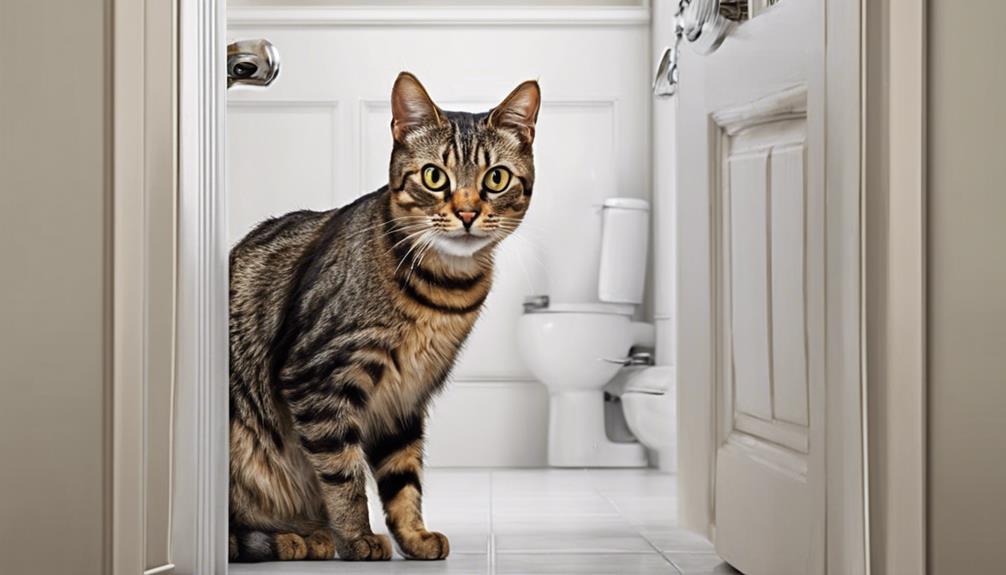
When it comes to your cat's perspective on bathroom time, it's important to understand their curiosity and need for attention. Cats often follow us to the bathroom seeking interaction and affection, making this a bonding moment for both parties.
Embracing these bathroom visits can strengthen the bond between you and your feline friend.
Cats Curiosity in Bathroom
Cats find the bathroom to be an captivating environment that stimulates their senses and curiosity.
- The rustling sound of a shower curtain can entice cats to investigate.
- The echo of their own meows in the tiled room can create a playful atmosphere.
- Sunlight streaming through a frosted window can cast mesmerizing patterns on the floor.
- The cool, sleek surfaces of the tiles offer a invigorating contrast to their fur.
- The absence of running water may prompt cats to search for the source of the intriguing sound elsewhere.
Cats Need for Attention
Entering the bathroom, we can observe how cats seek attention and affection from their owners in a desire for bonding moments. Your cat's need for attention becomes evident as they follow you into the bathroom, craving your companionship. This behavior showcases their love for you and their desire to be near you at all times.
Cats view bathroom time not only as a practical moment but also as an opportunity to connect with you on a deeper level. Offering them affection during these moments strengthens the bond between you and your feline friend. Understanding their need for attention during bathroom visits can help you nurture a more intimate and loving relationship with your cat.
Establishing Boundaries With Your Cat
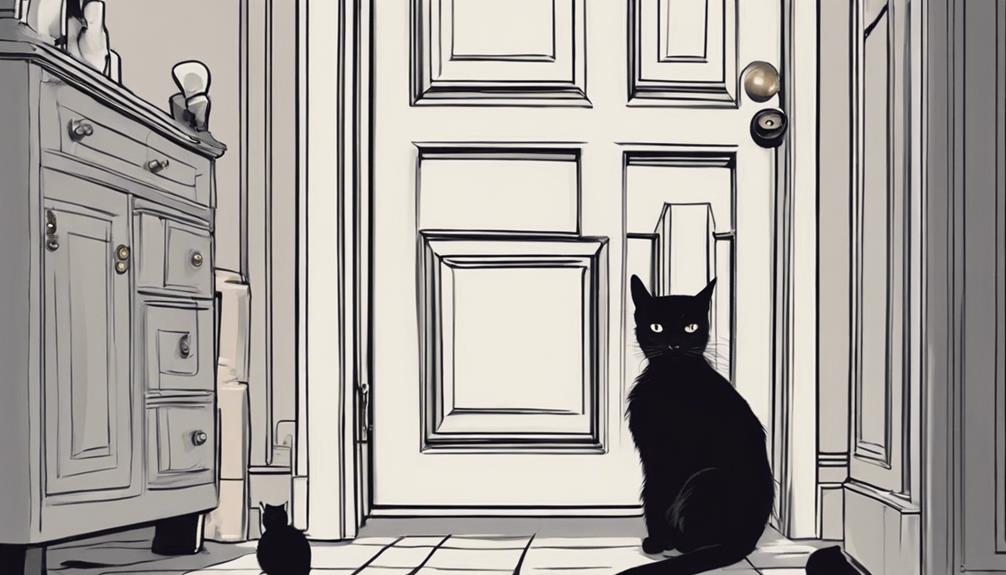
To establish a harmonious relationship with your feline friend, setting clear boundaries is essential. When it comes to interacting with your cat, boundaries help create a respectful and communicative environment. Here are some tips on how to establish boundaries with your furry companion:
- Consistent Enforcement: By consistently enforcing boundaries, you teach your cat what behaviors are acceptable.
- Positive Reinforcement: Using positive reinforcement techniques like treats or praise can encourage your cat to respect boundaries.
- Designated Space: Providing a specific area for your cat can help reinforce boundaries and give them a sense of security.
- Firm Yet Gentle: It's important to establish boundaries with a firm but gentle tone to maintain a harmonious relationship with your cat.
- Communication: Clear communication with your cat owner is key in setting and maintaining boundaries effectively.
Creating a Cat-Friendly Environment

How can we enhance our bathroom space to cater to our feline companions' needs and preferences effectively? Creating a cat-friendly environment in the bathroom is crucial to make sure that our furry friends feel comfortable and secure in this shared space. Start by placing a cozy blanket or pillow for your cat to relax on, providing them with a soft and inviting spot to rest.
Introducing cat-friendly plants like cat grass or catnip can also help create a stimulating environment that appeals to your cat's natural instincts.
Additionally, consider installing shelves or perches in the bathroom to give your cat opportunities to explore and observe their surroundings from different heights. Interactive toys or puzzles can keep your cat entertained and engaged while in the bathroom, making it a more enjoyable experience for them.
To conclude, make sure the bathroom is a safe and secure space where your cat can feel at ease, knowing they've a comfortable retreat whenever they might follow you in.
Addressing Cats Protective Instincts

Comprehending cats' protective instincts strengthens our bond with them and guarantees their sense of responsibility for our well-being is acknowledged. Cats exhibit their protective instincts in various ways, showing their affection through actions that may seem peculiar to us:
- Following you to the bathroom: Cats see this as guarding their territory, which includes you, ensuring your safety.
- Purring and rubbing against you: These gestures aren't just displays of affection but also acts of protection, showing they care for your well-being.
- Keeping watch while you sleep: Cats often position themselves near you while you rest, standing guard to protect you.
- Alertness to unfamiliar noises: Cats' protective instincts make them vigilant, always ready to shield you from potential threats.
- Leaving 'gifts' at your doorstep: While sometimes unsettling, this behavior stems from their instinct to provide for and protect their loved ones.
Understanding and responding to these protective instincts can strengthen our connection with our feline companions and affirm their role as guardians in our lives.
Seeking Attention in Bathroom Visits

Cats seek attention in bathroom visits because they crave closeness, are curious about our routines, and desire interaction.
When our feline friends follow us to the bathroom, they see it as a prime opportunity to bond and be close to us.
Their need for companionship drives them to seek out these moments of togetherness.
Cats Need for Closeness
During bathroom visits, our feline companions seek attention and affection from us, demonstrating their need for closeness.
- Your cat may rub against your legs while you're using the bathroom, seeking physical contact.
- They might purr loudly to express contentment and a desire for closeness.
- Some cats may even try to sit on your lap or the bathroom sink to be closer to you.
- Their eyes may follow your every move, showing a genuine interest in your presence.
- By seeking attention in the bathroom, your cat is reaffirming the bond and love they feel towards you.
Curiosity About Routine
Our feline companions often exhibit a keen curiosity about our daily routines, particularly when it comes to our bathroom visits. Cats seek attention during these moments, using them as opportunities to bond with us.
Their interest in our bathroom routine may stem from a desire to engage with our activities and habits. When they follow us to the bathroom, they're showing affection and a fascination with our daily rituals. This behavior allows them to feel closer to us and be involved in our daily lives.
Desire for Interaction
Seeking attention and affection, our feline companions often accompany us to the bathroom to bond and engage with our daily routines. When your cat follows you in, it's a sign of their desire for interaction. Here's why they do it:
- They view bathroom visits as quality time to bond.
- Cats may meow, paw at the door, or follow you to express their desire for attention.
- The bathroom offers a calm environment for cats to engage with you.
- Cats enjoy being near their humans and strive to make sure they don't miss out on any affection.
- Bathroom time provides an opportunity for cats to connect with their owners in a quiet setting.
Valuing Human Company in Cats

Valuing human company is a significant aspect of a cat's behavior, as seen in their tendency to follow their owners to the bathroom. Cats view this time as an opportunity to be close to their beloved humans, seeking companionship and forming strong bonds.
When our feline friends choose to follow us, it's their way of showing affection and a desire to spend quality time together. The bathroom becomes a place of reassurance for cats, knowing that their human is nearby, which further solidifies the special connection between us and them.
Comfort and Security for Cats

Cats find comfort and security in following their owners to the bathroom. It's a place where they feel safe and at ease, seeking reassurance and companionship in this familiar environment. Here are some reasons why the bathroom offers cats a sense of comfort and security:
- The bathroom provides a quiet sanctuary for cats to relax and unwind.
- Cats enjoy the peaceful atmosphere of the bathroom, away from the hustle and bustle of the rest of the house.
- The enclosed space of the bathroom gives cats a sense of security, making them feel protected.
- The bathroom's consistent layout and familiar scents create a comforting environment for cats.
- Bonding with their owners in the bathroom helps cats feel connected and secure in their relationship.
Understanding the importance of the bathroom as a haven for cats can help strengthen the bond between you and your feline friend.
Bonding Through Bathroom Time

When cats join you in the bathroom, they're engaging in a bonding experience that strengthens the connection between you and your feline companion. It's a special time where your cat seeks companionship and closeness, showing their love and affection in a unique way.
As you go about your bathroom routine, your cat may follow you, wanting to be near and share those moments with you. This behavior is a way for them to deepen the bond you share, creating a sense of togetherness and security.
By allowing your cat to join you during these intimate moments, you're fostering a sense of trust and companionship that's essential for a strong relationship. Embrace these bathroom visits as opportunities to strengthen your connection with your furry friend, as they demonstrate their desire to be close to you and share in your daily experiences.
Bonding through bathroom time is a beautiful way to enhance the special bond you have with your cat.
Fostering Human-Feline Companionship

Seeking to strengthen the bond between humans and felines, spending time together in the bathroom can enhance companionship and mutual understanding. As we foster this connection, here are some ways to deepen the bond with our feline friends:
- Engage in gentle petting sessions, providing comfort and reassurance.
- Create a peaceful atmosphere with soft lighting and calming scents.
- Offer interactive toys for playful moments and mental stimulation.
- Share quiet moments of relaxation, allowing for peaceful coexistence.
- Provide treats and positive reinforcement to associate the bathroom with positive experiences.
Respecting Cats Motivations

To understand why cats follow us to the bathroom, it's essential to contemplate their natural instincts and social behaviors. As a cat parent, recognizing that your feline companion may follow you due to their need for attention and affection is vital. Cats are known for their independent nature, but they also seek connection and interaction with their human family members. Bathroom time presents an opportunity for bonding and quality time together, which your cat may enthusiastically embrace.
Additionally, some cats may follow you out of curiosity, wanting to explore new sights and smells in the bathroom. It's important to respect your cat's motivations and understand that their actions stem from a place of companionship and curiosity. By acknowledging and honoring these motivations, you can foster a deeper connection with your cat and alleviate any potential anxiety in cats that may arise from feeling separated from their beloved human.
Harmonious Coexistence With Cats

When sharing our living space with cats, it's important to understand that bathroom time can become a shared experience.
Our feline friends might see this as a moment to bond and show affection. Setting boundaries when necessary can help maintain a healthy and respectful relationship with our beloved cats.
Bathroom Buddies
In the bathroom, cats often exhibit their affectionate nature by following their owners. It's a time when they feel vulnerable and seek comfort in your presence.
Here are some ways to enhance your bathroom experience with your feline friend:
- Create a cozy spot: Provide a soft blanket or a comfortable perch for your cat to relax while you're in the bathroom.
- Offer gentle affection: Petting and talking softly to your cat can reassure them and strengthen your bond.
- Respect their boundaries: If your cat seems uncomfortable, give them space and let them decide if they want to stay or leave.
- Provide entertainment: Place some toys or a scratching post nearby to keep your cat occupied.
- Maintain a calm environment: Keep the atmosphere serene and peaceful to help your cat feel at ease.
Feline Space Invasion
Our feline friends often make their presence known in the bathroom, asserting their desire for closeness and companionship with us. Feline space invasion during bathroom visits is a common occurrence driven by our cats' innate need to be near us.
Cats view these moments as opportunities for bonding and quality time. Understanding and respecting this behavior can deepen the connection between you and your furry companion. However, if boundaries are necessary to maintain personal space, gentle training and redirection can help establish a harmonious coexistence.
Tips for Cat Owners

To enhance your cat's well-being and strengthen your bond, consider implementing these practical tips for cat owners.
- Create a Cat-Friendly Area: Designate a cozy spot in the bathroom with a soft blanket or bed where your cat can relax while you're in there.
- Interactive Toys: Keep some toys handy to engage your cat during bonding time in the bathroom.
- Pheromone Diffusers: Consider using pheromone diffusers to help your cat feel more secure and content in the bathroom space.
- Grooming Sessions: Use this time to groom your cat gently, reinforcing positive associations with bathroom visits.
- Positive Reinforcement: Reward your cat with treats or affection for good behavior during bathroom bonding time.
Frequently Asked Questions
Do Cats Follow You to the Bathroom to Protect You?
Yes, cats often follow us to the bathroom to protect and care for us. It's their way of showing affection and ensuring our safety. Offering a specific spot for guard duty outside the bathroom can reassure them.
Do Cats Know When You Go to the Bathroom?
We comprehend the curiosity surrounding feline behavior. Cats, with their keen senses, may indeed know when we head to the bathroom. Their sharp instincts and observations often lead to them following us, seeking connection and company.
What Does It Mean When Your Cat Follows You to the Bathroom?
When your cat follows you to the bathroom, it signals their affection and protective nature. They value your presence and seek reassurance of your well-being. It's a bonding moment, showing they care deeply for you.
Why Does My Cat Get Clingy When I Go to the Bathroom?
When we head to the bathroom, our cats can become clingy seeking attention and closeness. It's a cozy space where they feel secure. They view it as a bonding opportunity to be near us, showing their desire for companionship.
Is My Cat Following Me to the Bathroom Because It Hates Certain Smells?
Some smells cats hate may actually be the reason why your cat follows you to the bathroom. Cats have a keen sense of smell and certain scents may be unpleasant for them, causing them to seek out their owner for comfort and protection.
Conclusion
To sum up, remember that your furry friend may follow you to the bathroom for a variety of reasons. Understanding your cat's behavior and establishing boundaries can lead to a harmonious coexistence.
By fostering human-feline companionship and respecting your cat's motivations, you can strengthen your bond.
So next time your cat accompanies you to the bathroom, appreciate the opportunity for bathroom bonding, creating a calm and comforting atmosphere for both of you.
Paul’s love for animals knows no bounds. As a dedicated writer and animal lover, Paul brings a unique perspective to our team. His firsthand experiences with various animals enrich our content and provide valuable insights into their behavior and needs. Whether he’s sharing tips for pet care or shedding light on pressing conservation issues, Paul’s passion for animals shines through in everything he does.
-

 Vetted1 month ago
Vetted1 month ago15 Best Dog Food Brands Recommended by Vets for Healthy and Happy Pups
-

 Vetted1 month ago
Vetted1 month ago14 Best Homemade Dog Food Recipes Your Pup Will Love – Vet Approved & Nutritious
-
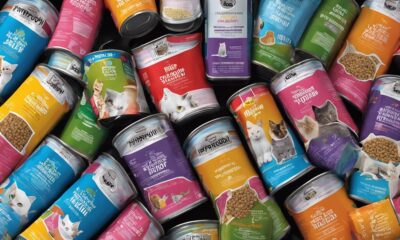
 Vetted1 month ago
Vetted1 month ago15 Best Cat Foods for Managing Hyperthyroidism – Vet Approved and Feline Friendly
-
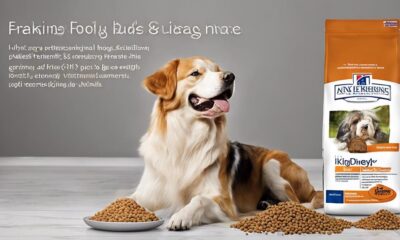
 Vetted3 weeks ago
Vetted3 weeks ago15 Best Dog Foods for Kidney Disease – Expert Recommendations for Your Pet's Health
-

 Vetted2 weeks ago
Vetted2 weeks ago15 Best Affordable Cat Foods That Won't Break the Bank
-

 Deers1 month ago
Deers1 month agoCaring for Baby Deer: Tips for Healthy Fawns
-
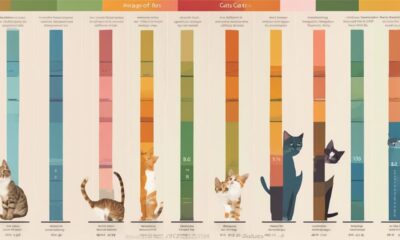
 Cats6 days ago
Cats6 days agoCat Weight Chart by Age: Kitten to Senior in Lbs
-
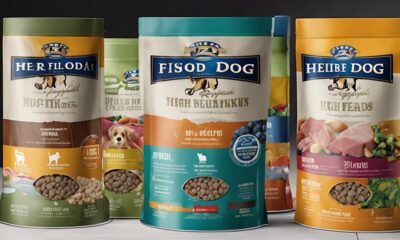
 Vetted1 month ago
Vetted1 month ago15 Best Kibble Dog Foods for a Healthy and Happy Pup





















